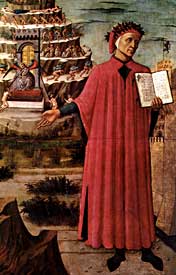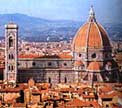Highlands Ranch High School - Mr. Sedivy
Highlands Ranch, Colorado
Voices
From The Middle Ages
Medieval
Poetry

Dante, crowned with poet's laurel, opens his Divine
Comedy
as souls struggle heavenward through Purgatory.
I5th-century fresco in the city's cathedral; Scala. Domenico di
Michelino
Divine Comedy
Dante Alighieri, 14th Century
Political activist as well as poet
and scholar, Dante was banished from Florence and led an exile's
life. His sonnets idealize his beloved Beatrice, wed to another.
In his masterwork, the Divina Commedia, he tours Hell, Purgatory,
and Paradise, encompassing the medieval universe in one majestic
view. Here he and his guide, the poet Virgil, enter the gates of
Hell:
"Through me the way is to the City of Woe:
Through me the way into the eternal pain;
Through me the way among the lost below....
Relinquish all hope, ye who enter here.
These words, of a dim color, I espied
Written above the lintel of a door.
Whereat: "Master, the sense is hard," I cried.
And he, as one experienced in that lore:
"Here all misgiving must thy mind reject.
Here cowardice must die and be no more...."
Here lamentation, groans, and wailings deep
Reverberated through the starless air,
So that it made me at the beginning weep.
Uncouth tongues, horrible shriekings of despair,
Shrill and faint voices, cries of pain and rage,
And, with it all, smiting of hands, were there,
Making a tumult, nothing could assuage,
To swirl in the air that knows not day or night,
Like sand within the whirlwind's eddying cage.
And I, whose mind failed to discern aright,
Said: "Master, what is it that my ear affrays?
Who are these that seem so crushed beneath their plight?"
And he to me: "These miserable ways
The forlorn spirits endure of those who spent
Life without infamy and without praise.
They are mingled with that caitiff regiment
Of the angels, who rebelled not, yet avowed
To God no loyalty, on themselves intent.
Heaven chased them forth, lest their allegiance cloud
Its beauty, and the deep Hell refuses them,
For, beside such, the sinner would be proud."

The Annunciation and Scenes from Dante's Divine Comedy.
Page from a missal, painted by Gherardo Di Giovanni 1474 - 1476.
Click the scene for an enlargement.
Sonnet
Dante Alighieri
Love reigns serenely in my lady's eyes,
ennobling everything she looks upon;
towards her, when she passes, all men turn,
and he whom she salutes feels his heart fail;
so that, with drooping countenance, and pale,
he then because of his shortcomings sighs:
before her, pride retreats and anger flies:
assist me, ladies, now to honor her.
All sweetness, all humility of thought
stir in the heart of him who hears her speak;
and he who sees her first is blest indeed.
And when she smiles her beauty is such as
cannot be told, nor in the memory held,
so fair, so new a miracle it is.
Dies Irae
13th Century
Attributed to Thomas of Celano,
disciple of St. Francis of Assisi, the poem vividly portrays the
reality of Judgment Day in the medieval mind. Its somber cadences
- Dies irae, dies illa / Solvet saeclum in favilla, / Teste David
cum Sibylla - echo today in Masses for the dead:
Dreaded day, that day of ire,
When the world shall melt in fire,
Told by Sybil and David's Lyre.
Fright men's hearts shall rudely shift,
As the judge through gleaming rift
Comes each soul to closely sift.
Then the trumpet's shrill refrain,
Piercing tombs by hill and plain,
Souls to judgment shall arraign....
When the judge his seat shall gain,
All that's hidden shall be plain,
Nothing shall unjudged remain.
Beowulf
8th Century
This oldest English epic, probably
by an Anglo- Saxon bard from Northumbria, draws on Norse mythology
as it portrays the warrior's quest for glory. Here the hero beheads
the mother of the water dragon Grendel and the monster himself,
using a weapon recalling Arthur's Excalibur:
Then he saw, hanging on the wall, a heavy
Sword, hammered by giants, strong
And blessed with their magic, the best of all weapons
But so massive that no ordinary man could lift
Its carved and decorated length. He drew it
From its scabbard, broke the chain on its hilt,
And then, savage, now, angry
And desperate, lifted it high over his head
And struck with all the strength he had left,
Caught her in the neck and cut it through,
Broke bones and all. Her body fell
To the floor, lifeless, the sword was wet
With her blood, and Beowulf rejoiced at the sight. ...
He...went walking, his hands tight on the sword,
His heart still angry. He ... took his weapon with him
For final revenge against Grendel's vicious
Attacks, his nighttime raids, over
And over, coming to Heorot when Hrothgar's
Men slept, killing them in their beds,
Eating some on the spot, fifteen
Or more, and running to his loathsome moor
With another such sickening meal waiting
In his pouch. But Beowulf repaid him...struck off
His head with a single swift blow. The body
Jerked for the last time, then lay still. ...
All that Beowulf took
Was Grendel's head and the hilt of the giants'
Jeweled sword; the rest of that ring-marked
Blade had dissolved in Grendel's steaming
Blood, boiling even after his death.
And then the battle's only survivor
Swam up and away from those silent corpses. ...
Song of Roland
11th Century
First among French epics, this chanson
de geste (song of lofty deeds) celebrates a feudal world prizing,prowess,
loyalty, and honor. Below, the brave Roland, aware at last that
his party is being cut to pieces, sounds his horn - too late. Charlemagne,
persuaded by the traitor Ganelon that Roland is only hunting, delays
turning back:
And now Count Roland in anguish and in pain,
With all his strength sounds the great horn again.
Bright drops of blood aye springing from his mouth,
Veins in his forehead are cracking with the strain.
That mighty voice cries out a second time;
Charlemagne hears it, high on the mountain pass,
Duke Naimon listens, and so do all the Franks.
Then says the king, "That is Count Roland's horn!
He'd never sounded it, except for an attack."
Ganelon says, "What battle can there be?
You have grown old, your hair is streaked with white;
The words you speak could well befit a child.
You ought to know how great is Roland's pride--
The wonder is God suffers it so long.
He captured Noples, and not by your command,
And then flushed out the Saracens inside;
He fought them all, Roland, your loyal man,
And then took water and washed the field of blood,
Hoping that you would not detect the fight.
Just for a rabbit he'll blow his horn all day!
Now he is playing some game to please his peers.
Who in the world would dare make war on him!
Ride on, I tell you! What are we waiting for?
We've far to go to see our lands once more."
More Medieval
Poetry
Back
to Top of Page



![]() 9375 South Cresthill Lane
9375 South Cresthill Lane ![]() Highlands Ranch, Colorado 80126
Highlands Ranch, Colorado 80126 ![]() 303-471-7000
303-471-7000

